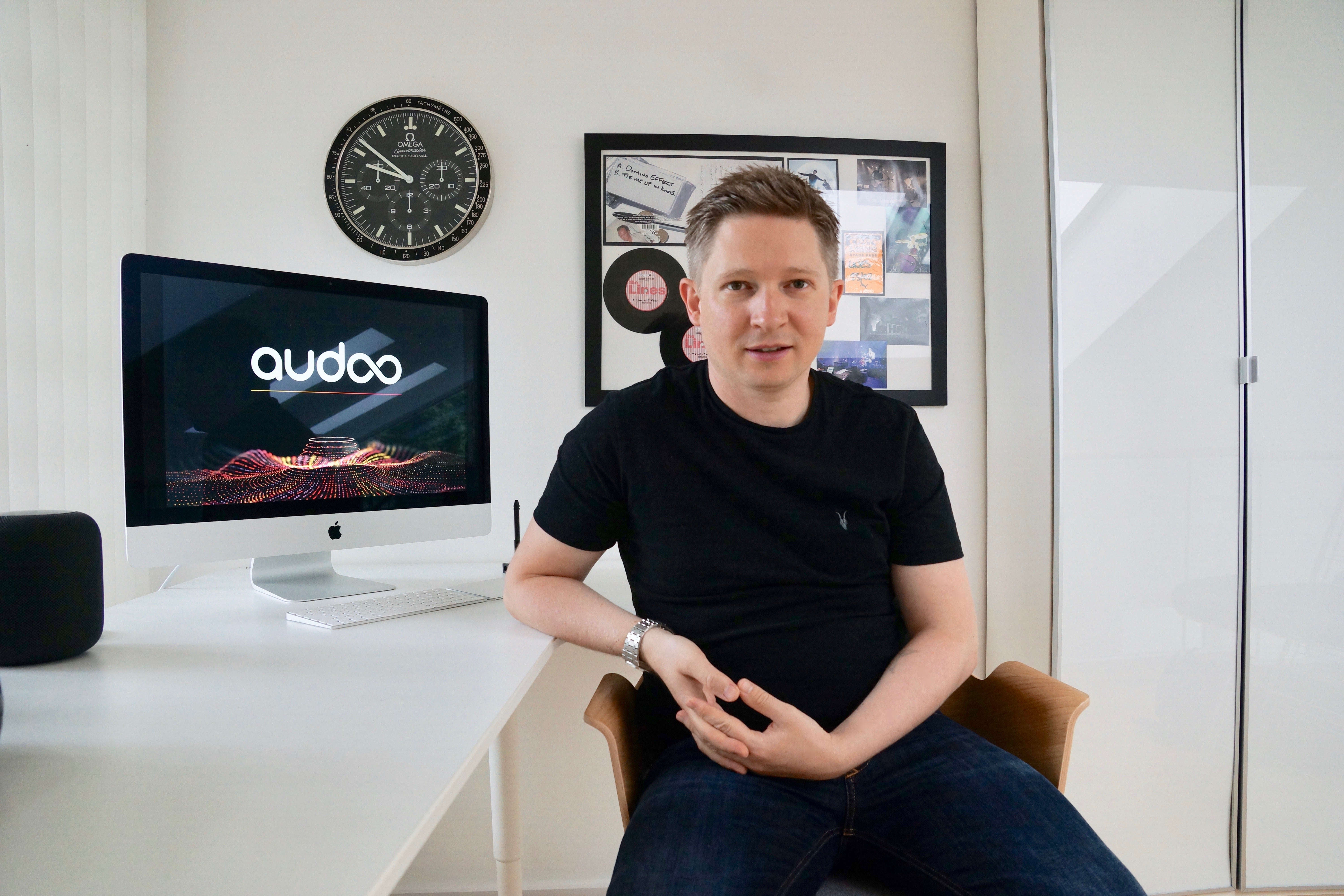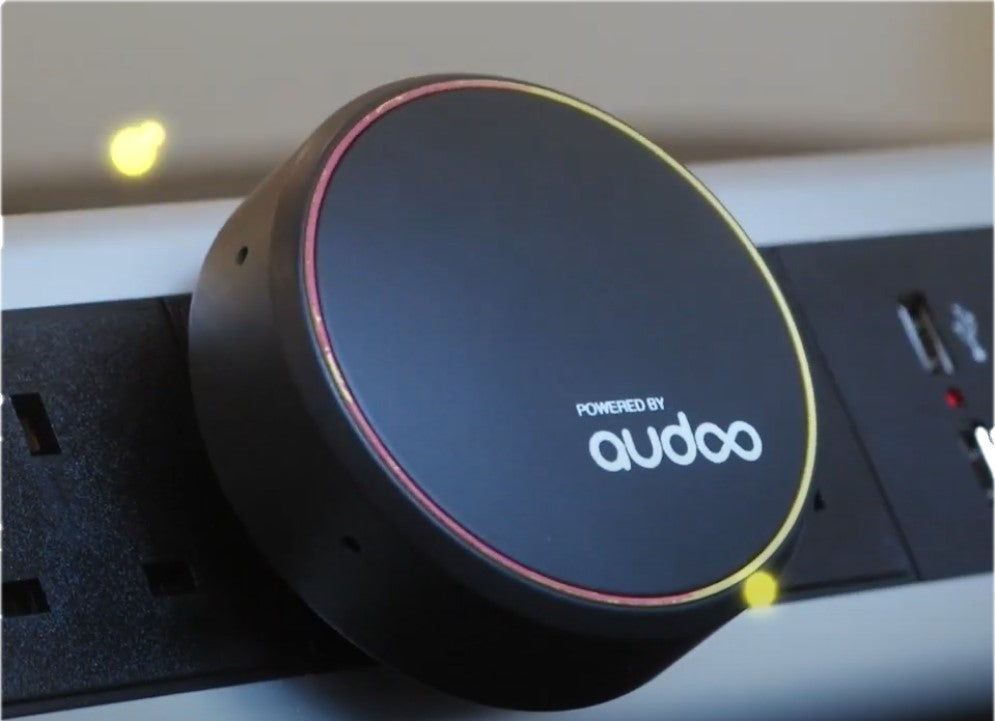Audoo is trying to ensure musicians get paid properly when their music is played
Musician Ryan Edwards realised he never knew how much he got paid when one of his songs was played, so decided to create Audoo and change that, writes Andy Martin


The idea for Audoo was born four years ago, in Selfridges on Oxford Street. Ryan Edwards was in there with his wife when he heard one of his band’s songs, “Domino Effect”, playing over the tannoy. “How much are you going to get paid for that?” asked his wife, very reasonably. “I don’t know,” he said. “But don’t buy that very expensive handbag.” He came up with Audoo to ensure that all musicians get paid properly whenever and wherever their music is played.
Edwards’s father was a would-be saxophonist from Stourbridge, and is a lifelong Motown fan, who even now hosts a Motown hour on Black Country Radio. “My dad has thousands of records,” Ryan recalls. “The house actually smelled of vinyl.” He had two passions growing up: music and Wolverhampton Wanderers. But football took a back seat as soon as he discovered the drums and the guitar.
He practised at break times and after school, and taught other kids to play. He was planning to become a music teacher until one sad day when his maths teacher took him on one side and said to him, “You’re not clever enough to be a teacher!” – a harsh putdown that aborted one brilliant career but set him on the road to glory with his indie rock band, The Lines. He was barely out of school before he was signing a record deal and touring the world – the US, Europe, even Russia – playing alongside heroes such as R.E.M. and The Killers. “They talk about an ‘overnight’ success,” says Edwards. “It was genuinely like that.”
Their high point was at a gig in Salzburg, Austria, one Sunday in 2007, playing in front of 70,000 people. The low point was the very next day when the band returned to England in triumph and were promptly dropped by their record label. “It was as brutal as that,” says Edwards with a rueful grin.
“What am I supposed to do with my life now?” Edwards found himself asking. He had a couple of A-levels and a work ethic, so he started knocking on doors on the high street and ended up at Carphone Warehouse. “I can sell phones,” he said, confidently. “OK, come in Saturday,” said the manager. “If you can sell two phones you’ve got a job.” He sold five and stayed with Carphone Warehouse for the next eight years, rising rapidly through the ranks, and became such a star that he was given the coveted job of working with Best Buy, the US company they were teaming up with – which soon retreated back to the US, battered and bruised by the financial crash, but not before making Edwards redundant yet again.
It used to be gigs, now royalties have become the core income for musicians. The only income, often. They have to get it right
Then he had a life-changing moment. He was at a wedding reception sitting next to a guy who had started making apps for some big companies. At this point he barely knew how to download an app. “Apps, yeah,” he said. “Know all about ’em” – thereby blagging his way into a job. “It was the experience of a lifetime,” says Edwards. Grapple Mobile, based in Soho, grew to over 100 people and went on to produce apps for some of the biggest brands on the planet, notably Visa and Fifa, for whom they created the “Global Stadium” for the 2014 World Cup in Brazil. “It brought the whole community into your living room,” says Edwards. And then they were bought up by Monitise.
Which is when we find Ryan Edwards and Mrs Edwards wandering around Selfridges in search of handbags and hearing that old Lines track being played instore. And his ex-rock star life spun around one more time. When he checked his royalties statement from PRS – the Performing Right Society – some months later, he couldn’t even work it out (although he was fairly sure he was not getting paid). But it prompted him to ask himself a question: how was PRS supposed to know that his song was being played in Selfridges anyway?
By chance it happened that the couple had recently had a smart energy meter installed at their home in Wimbledon. Edwards had said he was going to put it in the cupboard, because he didn’t fancy being reminded how much he was spending on energy. But he realised that the people who really wanted to know were the energy company. This way they didn’t have the expense of sending out a human being to check the meter and all that palava. It was a huge saving on time and energy: an automated process with no middle man and no paperwork either. But hold on a second! Couldn’t we – thought Edwards – do something like that for music?
Audoo is the result of that moment of insight. Because the answer is yes, you can do something exactly like that – this is a smart meter for audio. It’s simple and beautiful – a little plug-in that listens to the music (with a circular microphone array) and identifies who is playing what (like Shazam) and then, ultimately, transmits that information to PRS (or similar bodies) – and musicians like Ryan Edwards and thousands of others duly get paid. Without all the usual hassle. Everybody wins. You plug it in and the tech does the rest. Job done for Selfridges and all those other public places that play music – shops, pubs, gyms, hotels – right around the world. All the royalty company has to do is distribute the money.

“There’s never been a more relevant time,” says Edwards. “It used to be gigs, but now royalties have become the core income for musicians. The only income often. They have to get it right.” Despite having to slow the rollout in the UK while shops have been closed, Audoo is growing fast, already employs 30 people, and was interviewing for other jobs on the day I spoke to them, in territories right around the world. Edwards is revisiting (virtually) all the scenes of his previous rock-star career, but now with a plug-in in his hand rather than a guitar. “We are collecting the greatest set of data on music ever created,” he says.
Audoo has the backing or involvement of a lot of music-business notables, including the man behind the Spice Girls, Chris Herbert, who is now a non-executive director on the board. “They were the most popular band in the world when I was at high school,” says Edwards. “On behalf of all my generation who bought their CDs – or my parents in particular – we got some of the money back!”
A florist in Ascot wrote to Edwards to say that she was “worried” because she wasn’t sure the money she paid was going to the artist whose music she was playing. It turned out that the music she played most often was Abba. Edwards was able to write back to her to tell her that not only would Audoo resolve the problem, but that Bjorn Ulvaeus of Abba was one of the key investors and backers of the scheme. When Edwards told Bjorn the story, he said, “Tell her I’m not doing this to make lots of money – I’m doing it for the next generation.”
When Ryan Edwards looks back on his own record deal as an 18-year-old, he realises now that he was fairly naive. “All I asked was, ‘Where do I sign?’. Not many musicians are business people. You’ve got to learn how to build a business. Every song is a product. Having a great song is not enough.” The merchandising is crucial. “We used to make more out of T-shirts and baseball caps than from the gig.” Edwards offers some sound advice to the young up-and-coming rock stars of the future: “If you don’t have your ISRC (International Standard Recording Code) you won’t get paid; get yourself a good lawyer; and finally, don’t spend it all on a brand new car.”



Join our commenting forum
Join thought-provoking conversations, follow other Independent readers and see their replies
Comments